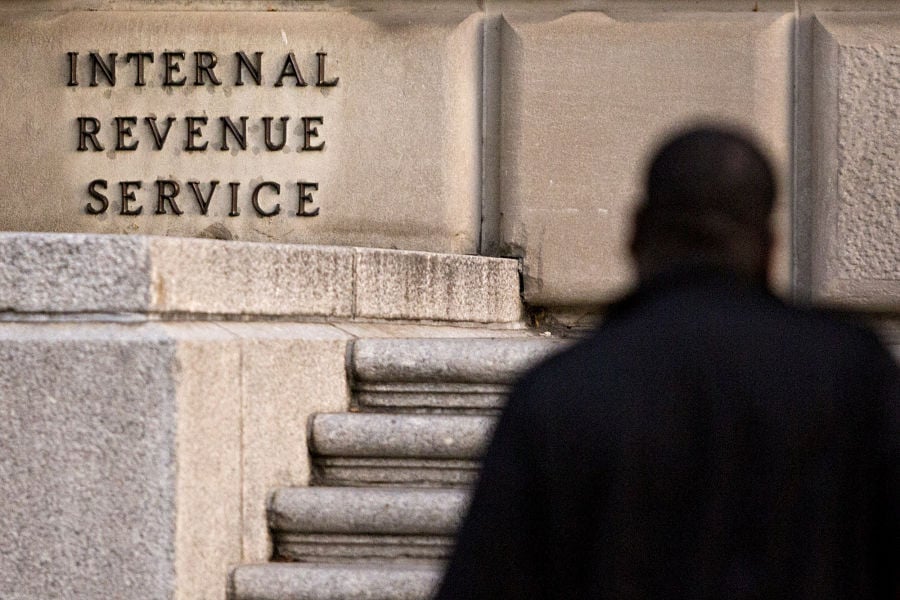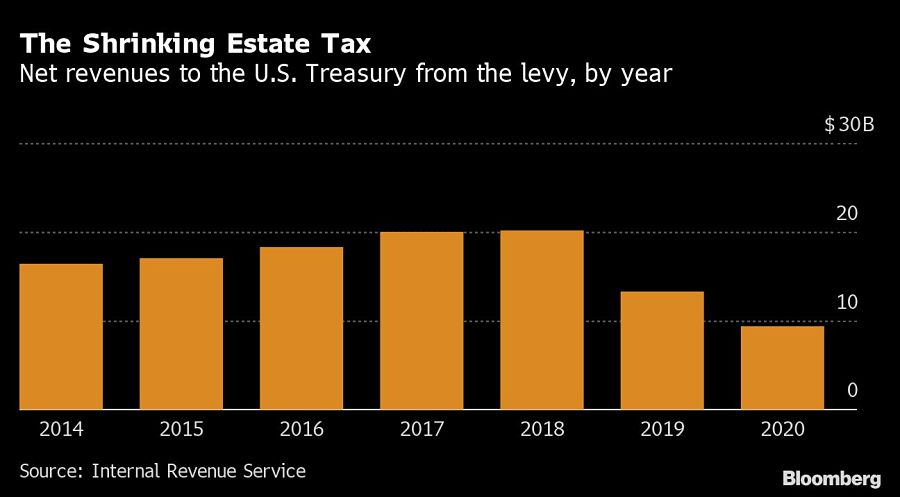

Revenue from the U.S. estate tax has been cut in half in two years, new data from the Internal Revenue Service shows, even as dynastic wealth soars.
Just 1,275 wealthy families paid $9.3 billion in estate tax to the U.S. Treasury in 2020. As recently as 2018, the IRS collected more than $20 billion from nearly 5,500 families.
The dramatic decline — to the point where the tax is paid by 0.04% of dying Americans — is largely the result of the tax overhaul enacted by Republicans in 2017, which doubled the amount the wealthy can pass to heirs without triggering the levy.
Married couples can now transfer $23.4 million over their lifetimes tax-free, but families with vastly greater sums can hire sophisticated advisers to get around the tax. Nike Inc. founder Phil Knight used a variety of techniques to transfer billions of dollars to his family tax-free, according to a Bloomberg investigation last month.
The estate tax is “easy to minimize,” said Richard Greenberg, a lawyer at Greenberg & Schulman based in Woodbridge, New Jersey. “With the combination of the doubled exemption and all of the estate planning techniques that are available, you can bleed a lot of money out of an estate and get a lot of wealth transferred.”
In recent months, Democrats had proposed cutting the exemption in half and closing many of the loopholes used by the super-wealthy. But, after pushback from some moderate Democrats, the latest version of President Joe Biden’s Build Back Better bill dropped those provisions.
The estate tax’s haul of less than $10 billion now represents an imperceptible share of revenue for the federal government, which in the last fiscal year collected more than $4 trillion. The modern estate tax was introduced in 1916 to help counter the growth of dynastic wealth.

Even before former President Donald Trump and Republican lawmakers loosened estate tax rules, revenue from the levy had stagnated, despite a surge of wealth among the very richest.
In the last five years, U.S. billionaires have doubled their collective net worth to more than $5 trillion, according to the Bloomberg Billionaires Index. At the top of the wealthiest families are the heirs of Walmart Inc. founder Sam Walton, worth more than $200 billion.
Though the levy is now easy to avoid, the IRS data gives insight into the U.S.’s largest fortunes, including where they’re located. More than a fifth of estate-tax payers lived in California, followed by Florida at 13%, New York at 9% and Texas at 6%.
Because the IRS gives families time to file estate tax returns, the 2020 data mostly reflects deaths that occurred in 2019.
Expect revenue from the tax to continue to drop in future years, said Tabetha Peavey, attorney advisor at the Tax Law Center at New York University, who previously worked on estate planning at a large firm.
In the years after the passage of the 2017 tax law, and especially in the last couple years, with an election looming and Democrats threatening to tighten the rules, “there was a big push to do more aggressive planning,” she said. “The higher exemption allows planners to leverage huge amounts of wealth out of an estate.”

While industry statistics pointing to a succession crisis can cause alarm, advisor-owners should be free to consider a middle path between staying solo and catching the surging wave of M&A.

New joint research by T. Rowe Price, MIT, and Stanford University finds more diverse asset allocations among older participants.

With its asset pipeline bursting past $13 billion, Farther is looking to build more momentum with three new managing directors.

A Department of Labor proposal to scrap a regulatory provision under ERISA could create uncertainty for fiduciaries, the trade association argues.

"We continue to feel confident about our ability to capture 90%," LPL CEO Rich Steinmeier told analysts during the firm's 2nd quarter earnings call.
Orion's Tom Wilson on delivering coordinated, high-touch service in a world where returns alone no longer set you apart.
Barely a decade old, registered index-linked annuities have quickly surged in popularity, thanks to their unique blend of protection and growth potential—an appealing option for investors looking to chart a steadier course through today's choppy market waters, says Myles Lambert, Brighthouse Financial.
